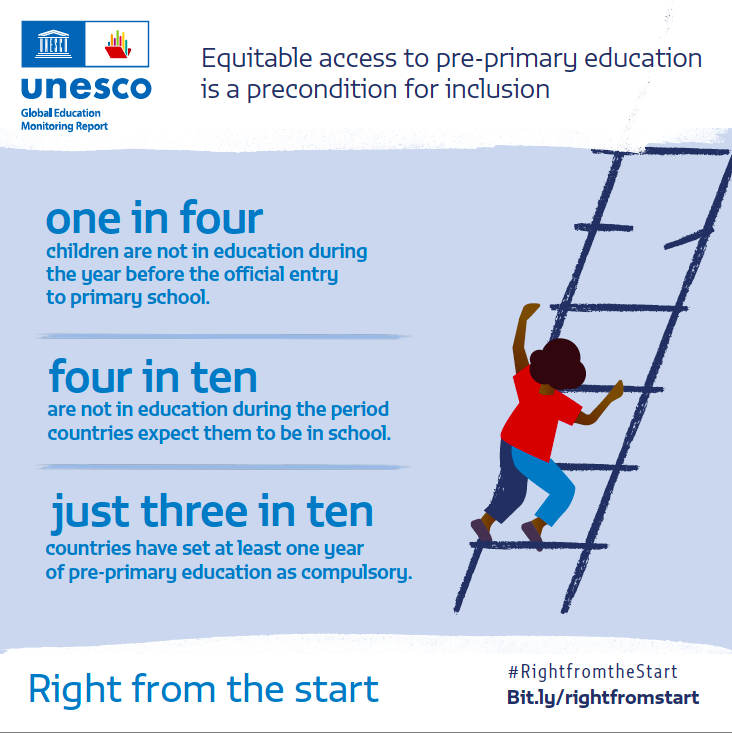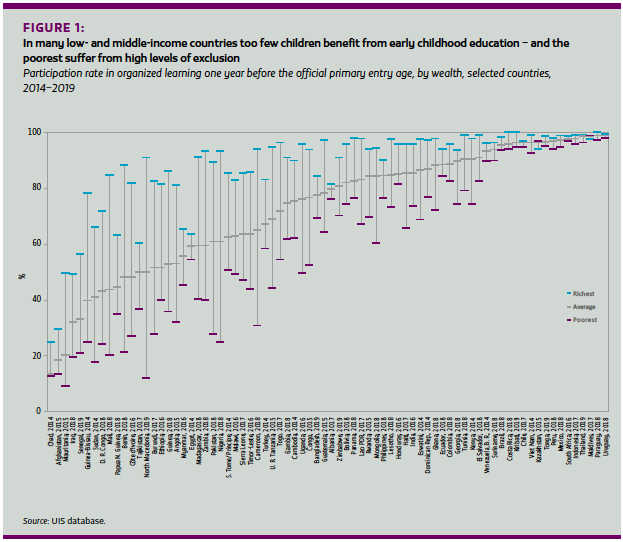-
This morning, a new policy paper, Right from the Start, reminds countries of their SDG 4 commitment to ensure that all girls and boys have access to quality early childhood development, care and pre-primary education so that they are ready for primary education.

Ensuring early universal access to education is the foundation for inclusion in the lifelong journey to learning and a decent life but, despite progress, an estimated 2 in 5 children, mostly in low- and lower-middle-income countries are still not enrolled in pre-primary school.
Despite encouragement for countries to make at least on year of pre-primary education compulsory in the Framework for Action and Incheon Declaration, currently only 28% of countries have done so, ranging from none in the Arab States to 55% in Latin America and the Caribbean.
The new paper is published along with a paper by UNESCO produced in partnership with the Open Society Foundations, Inclusive Early Childhood Care and Education: From Commitment to Action!, which also calls for a renewed global commitment to early childhood inclusion. They are released today ahead of the launch of a new Global Partnership Strategy for Early Childhood in September. Coordinated by UNESCO, the partnership will bring together more than 40 organizations active in early childhood care and education (ECCE) to support governments in providing effective ECCE services and in tackling new challenges arising from the COVID-19 pandemic.
Numerous benefits for children attending quality early education are transmitted from one generation to the next with positive impacts on society as a whole. Meanwhile, the absence of early childhood education can lock children into a lifetime of deprivation and marginalization. The new paper, Right from the Start, however, calls for all children ne be able to access a minimum level of services, regardless of socio-economic status, ethnicity, language, disability or remoteness. But large participation gaps still exist between the richest and poorest children, rising to over 60 percentage points in some low- and middle-income countries such as Benin, Cameroon and Mali. The widest gap is in North Macedonia where 91% of the richest but just 12% of the poorest benefit from early childhood education.
Other groups face particular barriers to access. Over half of Roma children in Europe are still missing out on pre-primary school.

Aside from access, too little attention is being given to ensure high quality standards in pre-schools for the most vulnerable children. Children need safe schools with access to basic hygiene and teachers who have received training to care and support them adequately so they could thrive.
In Malawi, for example, a survey of caregivers found that most were female volunteers and only one in three had relevant qualifications. Pre-primary education is also critical in identifying students with special needs and assigning them appropriate interventions, but such screening systems were found to be rare in a study of 21 eastern and Southern African countries. The lack of data for certain groups of children at this level is even more critical. The reality of some marginalized children, particularly those with disabilities, is poorly documented or not at all.

Countries should address barriers to inclusion, such as ineffective or inconsistent laws and policies, lack of teacher preparation, non-inclusive curricula, absence of data on those excluded from education, lack of political will and untargeted finance. Issues of inclusion in early childhood care and education need to be addressed through cross-sectoral policies that consider the diversity of learners, including refugee and asylum-seeking children.
The new paper is in support of the recommendations in the new Global Partnership Strategy as follows:
- Mobilize all nations and relevant international agencies to collaborate in attaining SDG targets related to early childhood education.
- Strengthen existing inter-agency and global partnerships and forge new ones, as needed, for coordination and collaboration to implement strategies for policies and services to improve child development and family wellbeing.
- Substantially increase investment in pre-primary education in low- and middle-income countries which on average only received 2% of education budgets in 2018.
- Expand annual international aid to pre-primary education from an average of 7% of education aid in 2016 to at least 10% by 2030.
Social media pack is available here
